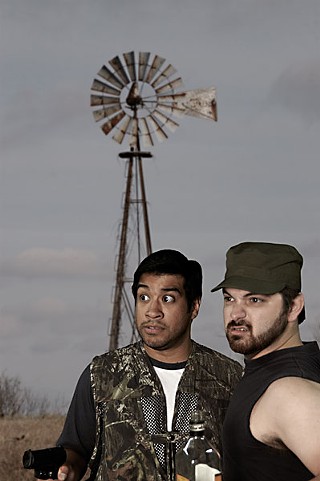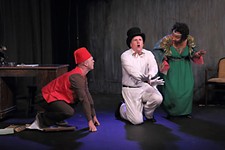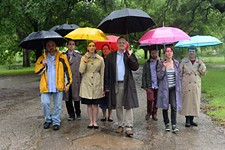Dos Pocitos
Teatro Vivo teaches us how to preserve the past in a future South Texas
Reviewed by Adam Roberts, Fri., Sept. 2, 2011
Dos Pocitos
Salvage Vanguard Theater, 2803 Manor Rd., 413-6791www.teatrovivo.org
Through Sept. 3
Running time: 1 hr., 45 min.
Dos Pocitos. "Two Little Wells." Or, in the case of Teatro Vivo's new original production, the name of an apocalyptic border town forgotten by the U.S. government and abandoned by nearly all its residents. Set in 2026, Dos Pocitos follows cousins Abel and Adam on their adventurous quest to recover the nostalgia of home – and the consequences faced when that home is not what it was.
Teatro Vivo's mission of "producing quality bilingual theater accessible to all theater audiences and artists" is achieved in every way with Dos Pocitos. Local playwright Raul Garza's script (one of three workshopped through the company's Austin Latino New Play Festival in April) weaves a sweet yet existential tale replete with thematic tropes that will be recognized by audience members from any cultural background. However, its unique perspective also affords the gift of a vibrant prism for those of us less familiar with the Latino experience in South Texas.
I'm a Midwesterner by provenance, but the friend who accompanied me to Dos Pocitos was raised in Weslaco, a border town near McAllen. She could barely wait until the house lights had dawned for intermission to launch ecstatically into a series of stories from her childhood, each memory triggered by events that had just unfolded onstage. One of the most prevalent was of afternoons spent swimming in her family's tanque, the large tank used to collect rainwater for dispersal to cattle troughs. In the play, Adam and Abel (portrayed by Mateo Barrera and Mario Ramirez, respectively) likewise take a plunge into the tanque of their childhood years. But although the actors pantomime the water in which they "swim," the reality is that the tanque onstage is empty.
This empty tank is, for me, the dichotomy that one encounters throughout Dos Pocitos. Though I had never even heard of a tanque until my friend explained its context, the significance was clear. Memory can be deceptive – sometimes the experiences we think we can re-create are destined to remain distant fantasmas of the past, never to be resurrected. This is the juncture at which Garza's tale becomes a cautionary one: If we rely too heavily on the quest for a home of the "no place like" variety, we run the risk of compromising rewards found in the present and future. If we look only to the future and neglect the lessons and fondness of the past, we will undoubtedly misplace artifacts that in many ways come to define all heritage.
As we learn from the setting of the final scene, the tanque water that once refreshed our dos pocitos has been displaced, not lost. Much like their decimated hometown now plagued by drug cartels, theft, and violence, hope for regaining the cultural past still exists in the present, but action must be taken to find and cultivate it. This is the very lesson that Teatro Vivo teaches us. The preservation, development, and promotion of cultural heritage is a crucial pursuit, and the theatre can serve as a beautiful catalyst for sharing this work with all audiences.











